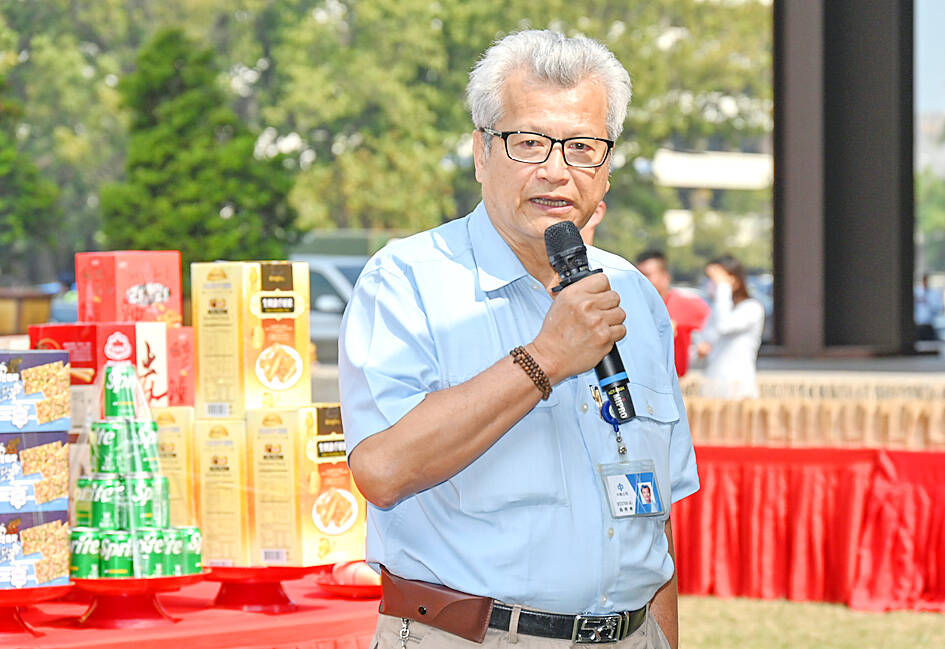China Steel Corp (中鋼), the largest steelmaker in Taiwan, yesterday said that it would raise prices moderately for some products and leave others flat for domestic deliveries next month.
The Kaohsiung-based steelmaker said it is to increase prices for cold and hot-rolled steel by NT$300 per tonne and keep prices unchanged for electrical steel, electro-galvanized steel sheets and other products.
The decisions came after a monthly price review to reflect the latest industrial and economic outlook at home and abroad, it said.

Photo courtesy of China Steel Corp
China Steel cited the IMF as saying that the world economy might expand 3.1 percent this year, from a 2.9 percent uptick last year, with the US to maintain a mild increase and Europe to emerge from a recession.
Regionally, China’s stimulus measures would lend support to its fragile economy and Taiwan’s exports would resume growth momentum, allowing the nation’s GDP growth to accelerate from 1.4 percent to 3.15 percent, the steelmaker said.
The trends are positive for steel demand as evidenced by last month’s healthy purchasing managers’ index in the US and the eased downturn in China, it said.
Beijing is encouraging investment to speed up urban renewal, social housing and infrastructure projects, boding well for the steel industry, it said.
Auto industry intelligence provider MarkLines is looking at a 2.7 percent increase in global vehicle sales from last year to 9.23 million this year, which is favorable for steel used in vehicles, it added.
As for steel supply, China’s steel stock and output last month dropped 26 percent and 23.3 percent year-on-year due to the market’s crude steel controls and output restrictions aimed at winter environment protections, it said, adding that the tightening measures explained why crude steel productions in December fell 14.9 percent to a seven-year low.
Furthermore, South Korea’s POSCO, one of the world’s largest steelmakers, is conducting annual maintenance this month and would cut its output by 1 million tonnes, it said.
Data compiled by the World Steel Association showed that crude steel production in December fell 5.3 percent for the 10th straight month to 135.7 million tonnes, positive for the steel market moving forward, it said.
As for raw material prices, iron ore last month cost about US$120 to US$130 per tonne while coking coal hovered at about US$310 to US$320 per tonne, relatively high to buttress steel prices, China Steel said, adding that the local currency’s earlier depreciation against the US dollar helped drive up prices for imports.
China Steel said it exercised restraint in pricing after taking into consideration the competitiveness of domestic firms downstream.
The pickup in steel prices is likely to be sustained given that first-tier peers POSCO this month raised its hot-rolled steel by US$38 per tonne, Japan’s Nippon Steel Corp increased by US$34 per tonne and China’s Baowu Steel Group Croup (寶武鋼鐵) hiked prices by US$14 per tonne, it said.

GROWING OWINGS: While Luxembourg and China swapped the top three spots, the US continued to be the largest exposure for Taiwan for the 41st consecutive quarter The US remained the largest debtor nation to Taiwan’s banking sector for the 41st consecutive quarter at the end of September, after local banks’ exposure to the US market rose more than 2 percent from three months earlier, the central bank said. Exposure to the US increased to US$198.896 billion, up US$4.026 billion, or 2.07 percent, from US$194.87 billion in the previous quarter, data released by the central bank showed on Friday. Of the increase, about US$1.4 billion came from banks’ investments in securitized products and interbank loans in the US, while another US$2.6 billion stemmed from trust assets, including mutual funds,

Micron Memory Taiwan Co (台灣美光), a subsidiary of US memorychip maker Micron Technology Inc, has been granted a NT$4.7 billion (US$149.5 million) subsidy under the Ministry of Economic Affairs A+ Corporate Innovation and R&D Enhancement program, the ministry said yesterday. The US memorychip maker’s program aims to back the development of high-performance and high-bandwidth memory chips with a total budget of NT$11.75 billion, the ministry said. Aside from the government funding, Micron is to inject the remaining investment of NT$7.06 billion as the company applied to participate the government’s Global Innovation Partnership Program to deepen technology cooperation, a ministry official told the

Taiwan Semiconductor Manufacturing Co (TSMC, 台積電), the world’s leading advanced chipmaker, officially began volume production of its 2-nanometer chips in the fourth quarter of this year, according to a recent update on the company’s Web site. The low-key announcement confirms that TSMC, the go-to chipmaker for artificial intelligence (AI) hardware providers Nvidia Corp and iPhone maker Apple Inc, met its original roadmap for the next-generation technology. Production is currently centered at Fab 22 in Kaohsiung, utilizing the company’s first-generation nanosheet transistor technology. The new architecture achieves “full-node strides in performance and power consumption,” TSMC said. The company described the 2nm process as

JOINT EFFORTS: MediaTek would partner with Denso to develop custom chips to support the car-part specialist company’s driver-assist systems in an expanding market MediaTek Inc (聯發科), the world’s largest mobile phone chip designer, yesterday said it is working closely with Japan’s Denso Corp to build a custom automotive system-on-chip (SoC) solution tailored for advanced driver-assistance systems and cockpit systems, adding another customer to its new application-specific IC (ASIC) business. This effort merges Denso’s automotive-grade safety expertise and deep vehicle integration with MediaTek’s technologies cultivated through the development of Media- Tek’s Dimensity AX, leveraging efficient, high-performance SoCs and artificial intelligence (AI) capabilities to offer a scalable, production-ready platform for next-generation driver assistance, the company said in a statement yesterday. “Through this collaboration, we are bringing two